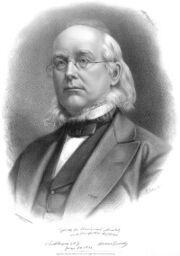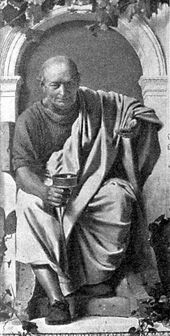Horace
Quintus Horatius Flaccus (65 BC – 8 BC) was a prominent Roman poet. He is known in the English-speaking world as Horace (/ˈhɔrɪsˌ/). In the Latin-speaking world, he is not known as anything, because Latin is dead, and so is Horace. In the dodgier neighborhoods of Rome in those days, he was known as Flaccid Quint. It being over 2,020 years since those days, it is surprising that he is known as anything at all, but the reason is that the most frequent subject of the poetry of Horace was Horace.
Horace was an officer in the Republican Army at the time it bombed at Philippi, which was around the time that Rome bombed at being a republic. When Octavian (or Augustus) became emperor, Horace stuck around as an official spokesperson. His poetry did a historic balancing act between toeing the party line and being of interest to normal people.
Childhood
R. Barrow writes that Horace "tells us far more about himself than any other great poet in antiquity," R. Barrow evidently being one of the few who finds this interesting. By comparison, Rock And Roll Fred tells this writer far more about himself than does anyone else at the bar, and it is not.
Anyway. Horace was born on 8 December 65 BC — no one seems to know what day of the week that was — in Venusia in southern Italy. His home was on a trade route between Apulia and Bucania, and his appreciation of language may have been enhanced by those using that route, assuming that truckstops were not much different then from now. His mother must often have washed his mouth out with soap (in Latin, lava). It is possible that soldiers were relocated to his region from Rome for their role in the Social War, which proved that they "do not get along with others," and this could have been a source of even more crude language. His father was at one time a slave but gained his freedom and became an auctioneer, yet another basis of Horace's off-color writings. Horace has some very nice things to say about his father, but nothing at all to say about his mother. Mothers often complain that "You never write me."
Horace's mother invites our speculation, except that this entire section has been guesswork. Nevertheless, spending decades doing the same supports large departments at many modern universities.
Adulthood
Horace left Rome for the Academy in Athens at the age of nineteen. There the Epicureans begged him to take second helpings, while the Stoics implored him not even to take a first. He palled around with Marcus, the idle son of Cicero. Idleness they shared, while being related to someone that history has heard of, they did not. It was in Athens that Horace would have been bitten by the poetry bug.
After Caesar was assassinated, who should appear in Athens but Brutus. The famous "Et Tu" guy fell in with the Epicureans, and often Et three. He was looking for fighters to return to Rome and help restore the republic. Brutus hit banquets and receptions and made an impression on all the naïve young men, which would definitely include Horace, especially after Brutus gave him the rank of Clivus Multrum, a rank usually reserved for those who knew a little something about combat, promising him that he would learn the ropes on the march. Learning to urinate outdoors in the wilds of northern Greece was difficult, but figures into some of his later works.
As Michael Jackson would say much later, "I'm a pisser, not a fighter," and this applied to Horace in spades. Triumvirs Octavian and Mark Antony arrived to disabuse the troupe of their notions of going back to republic. The battle went poorly for the rebels and, showing signs of his signature self-absorption, Horace would write that he fled without his shield. However, as he also practices self-deprecation, he probably really didn't.
Octavian offered his opponents amnesty, and Horace took it and returned to Rome. But the government had seized the family home, which he would later claim gave him the awful choice between poetry and poverty. In fact, he quickly found a mid-level job as a Court Poet (Court Jesters not being invented for many more centuries). This sinecure gave him plenty of time for writing on the side, even though he had to use a chisel on his tablets rather than a modern stylus.
Poet
Horace's first works were the Epodes. Civility in Rome had been waning for a century. We would know this and the Romans would not, as lifespans in Rome were 40 years, less if you were in power. The little guys got wealthy through plunder and corruption, while the powerful did so through murder and the double-cross. V.G. Kiernan writes, "all the problems were of a social nature, which the Hellenistic thinkers were ill qualified to grapple with," as though he would know. But grapple with it Horace did, and by adapting poetry into a style we now call nagging. These were the first Public Service Announcements, even though there was no network on which to broadcast them. A typical one went, "Eat your vegetables, and don't knife your boss."
The Epodes played the key role of signaling to the emperor that Horace might actually be useful. Horace was a friend of Virgil, often consoling him that the only reason readings of the Aeneid so often induced sleep was the audiences' own poor upbringing. Virgil introduced Horace to Maecenas, the chief-of-staff of Octavian, who was now calling himself Augustus Caesar. The boss knew Horace was a fan of the republic who had fought against him in Greece, but must have decided, "Keep your friends close and your enemies closer," or at least on the payroll.
Horace traveled abroad with Maecenas, almost drowning the both of them in 36 BC, and may have been at the Battle of Actium in 31 BC, where Augustus finally got the last laugh on Antony, in the swordplay sense. The net result was that, though Antony bought the farm, it was Horace who took possession of one, and thus spent even less time at work, where he was now a solid shill for the government. Suetonius tells us that Augustus himself asked for Horace to write a poem addressed to Augustus. The result was Horace's second Epistles, which celebrated the military victories of Augustus's sons and was the most brazen work of official vanity until Barack Obama would appear on a stage in front of styrofoam Greek columns. Another work was to be sung in a temple to kick off the local version of the Olympics. Horace had shown posterity how to "go along to get along."
The poetry itself

Horace's poetry used hexameters and iambs, with alcaics and sapphics, and oregano to taste. It is often served with ketchup. But it is all fatefully written in Latin, as though people were always going to speak it, and nearly all cryptic except when using the services of a translator.
Again, Horace's favorite subject was Horace. Modern critics divide classical poetry into autobiography and abstraction, but the distinction is not relevant for Horace, who inserted himself into whatever was going on in his poems, always "seeking true peace of mind while shunning vices like greed" while safely on the public payroll and never criticizing anyone who was truly powerful. No one can read Satires 2.6, in which he composes tedious serial puns of his own name, without shedding a tear of joy.
No one in Rome or Greece had ever written poetry, such as the Epistles, in the form of letters. We regard this as a completely new genre, because we reject the possibility that they were actually letters that he always meant to send to the addressees but could never seem to find change to buy postage. He begins the Epistles by stating, "I put aside both verses and all those other games: What is true and what befits is my care, this my whole concern," thence launching into verses and games. But it is ambiguity. Ambiguity permeates the Epistles. It is ambiguity when Horace does it. It will be vague and cryptic if you try it. Horace even dabbled in porn in the Odes. It doesn't get the job done either.
Reception

Initial reaction to Horace's works was not positive, but by the time he had cranked out three Odes, he was regarded as Rome's premier lyricist, and not coincidentally as the emperor's pet. No other poet was to produce comparable works in the next four centuries, probably because, in those four centuries, it simply did not pay to call attention to yourself except in the case that you owned all the swords.
In Epistle 2.1, his vanity poem for Augustus, Horace works in a request to be declared a "classic" poet, and this only if his first request, immortality, could not be granted. Horace got part of his wish, as his stuff got through the Dark Ages, though he did not. However, by the seventeenth and eighteenth centuries, poets were copying his style, some even writing in Latin.
Horace's heroic notions would continue to echo in the musty halls of academe. "Dulce et decorum est / Pro patria mori" would be reborn as, "I regret that I have only one life to give for my country," thence to "a war to end all wars" and then, "I am not a crook," from which it is a short hop to, "Bitch set me up."
Departure
Suetonius gave a second-hand description of Horace's sexual activities, which he said involved mirrors. That is, not only did Horace's poetry revolve around Horace, but his sex life did too. Horace died in 8 BC, which anyone who can cipher negative numbers knows would make him 56. It is speculation to say that his manner of death was during a moment of personal rapture through auto-eroticism, literally dying with a smile on his face, but the reader has no better theory.
Unfortunately, Horace did more than author the request for immortality stuck into the vanity Epistle he wrote to Augustus; Horace also signed a document that Augustus had requested from everyone in the Administration: a Last Will making Augustus the heir apparent. This tradition, too, extends to the present day, every time someone names his love-for-the-ages to be the beneficiary of his life insurance policy. No rhyme, no reason.
| Featured version: 16 April 2015 | |
| This article has been featured on the main page. — You can vote for or nominate your favourite articles at Uncyclopedia:VFH. | |



